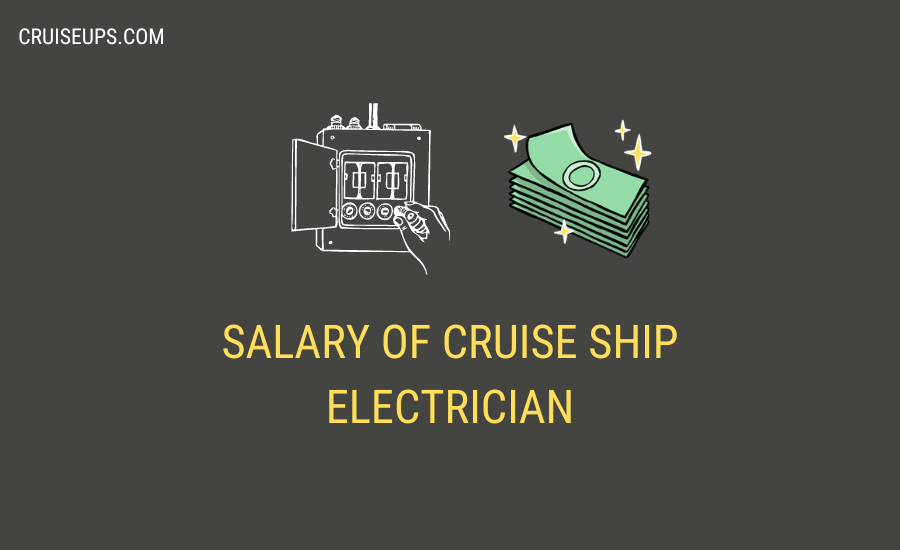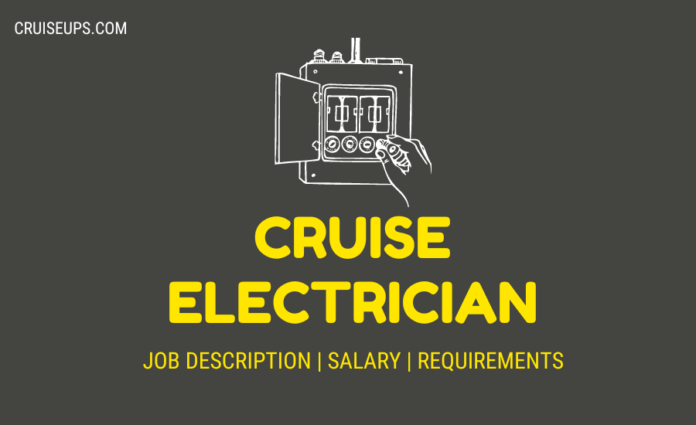If you are an experienced electrician or just starting your career in this area, give this article a read; as it provides you detailed insights about getting a job on a cruise ship. Let’s read further.
Are you looking to work in an exciting, ever-changing environment? Have you dreamed of traveling the world while still doing meaningful work? If so, a career as a cruise ship electrician may be the perfect opportunity for you.
As a cruise ship electrician, you’ll be responsible for maintaining and troubleshooting all of the electrical systems on board. You’ll also have the opportunity to explore some of the most exotic and beautiful locations around the globe. No two days will be alike as you help keep passengers safe and comfortable with your expert knowledge of electricity.
If this sounds like something that would interest you, read on! This article will provide an overview of what it takes to become a successful cruise ship electrician, from qualifications to job duties and more.
What is a cruise ship electrician?
Cruise ship electrician is an important role in the maritime industry. It involves the maintenance, repair, and installation of electrical systems on cruise vessels. It’s a job that requires a strong understanding of electricity and electrical safety regulations.
A cruise ship electrician needs to be detail-oriented and have great problem-solving skills in order to diagnose any issues with the electrical systems. They must also be familiar with all relevant maritime laws and regulations so they can ensure compliance at all times. Additionally, they need to communicate effectively with other staff members and passengers as they will often be working in public areas or leading teams of workers.
It is essential for any cruise ship electrician to be able to work independently as well as part of a team, under pressure and within tight deadlines. With these qualities, they can help make sure that the cruise vessel remains safe and operational at all times.
The next section will take a closer look at the job description and list of responsibilities associated with being a cruise ship electrician.
See also: Cruise Ship Cabin Steward
Job description and responsibilities of a cruise ship electrician
Cruise ship electricians play a vital role in the maritime industry. They are responsible for maintaining, repairing and installing electrical systems on cruise vessels to ensure that passengers and crew are safe at all times.
These include:
-
Technical skills:
- Electrical System Maintenance: The electrician is responsible for maintaining all electrical systems on the ship, including lighting, generators, motors, switchboards, and electrical distribution systems. They must check and test these systems regularly to make sure they are functioning properly and safely.
- Electrical Repairs: When any electrical system on the ship fails, the electrician must quickly diagnose the problem and make repairs to get the system up and running again. They must also replace any faulty components and perform any necessary maintenance.
- Electrical Installations: The electrician must be able to install new electrical systems and components on the ship, as well as modify existing systems to meet the ship’s changing needs.
- Safety Compliance: The electrician must ensure that all electrical systems on the ship comply with all relevant safety regulations and standards. They must also be able to detect and correct any safety hazards.
- Documentation: Must keep accurate and up-to-date records of all electrical systems on the ship, including maintenance, repairs, and installations. They must also be able to provide documentation to support their work.
- Troubleshooting: The electrician must be able to quickly and effectively troubleshoot any electrical problems that arise on the ship. They must be able to diagnose the problem and make repairs quickly to minimize any disruption to the ship’s operation.
- Diagnosing any issues with the electrical systems
- Understanding relevant maritime laws and regulations
-
Interpersonal skills:
- Communicating effectively with other staff members and passengers
- Working independently as well as part of a team under pressure
These technical and interpersonal skills enable them to respond quickly to any electrical problems that may arise on board the vessel, keeping it running safely and efficiently. To be successful in this role, they must also possess strong problem-solving abilities, attention to detail, and excellent time management skills.
Requirements
In order to become a successful cruise ship electrician, there are some additional requirements which must be met.
Firstly, it is important for the individual to have an understanding of safety protocols and procedures related to electrical systems. This includes knowledge of how to correctly identify and safely respond to any malfunctions or hazardous situations that may occur on board the vessel.
Additionally, cruise ship electricians must be able to work in small spaces, often with limited access to tools and other materials. They also need to possess strong physical stamina as the job requires working long hours in various weather conditions.
Finally, being familiar with the different types of electrical systems used on board ships is essential for this role. This includes knowledge of generators, propulsion systems, power distribution networks, motors, lighting systems and more. All of these elements come together to ensure a safe and reliable electrical supply while at sea. With all these qualifications in place, a person can expect an attractive salary when they obtain a position as a recreational ship electrician.
Salary
The salary for a cruise ship electrician is highly competitive, with experienced professionals often earning more than their counterparts in other industries. According to ZipRecruiter, the average salary for this role is around $50,589 per year. Those with more experience may be able to earn up to $91,000 or more annually.

Some cruise lines offer additional bonuses and benefits depending on performance or years of service.
So if you are looking for a new challenge that offers excellent pay and benefits, then becoming a cruise ship electrician could be right for you!
How to become?
You must have a solid foundation in electrical engineering, as well as experience working with marine-grade electrical systems. In addition, many employers prefer to hire candidates who have specialized certifications or training in the field.

If you’re ready to embark on your journey toward a sea ship electrician, here are some steps to get you started:
- Develop your technical skills – this includes taking courses and obtaining certifications related to electrical engineering as well as any additional training related to marine-grade systems.
- Prepare for interviews – be sure to research the company or specific job role that you are applying for. This will help you create an effective resume and prepare for any potential questions during the interview process.
- Network – talk with current professionals in the industry and attend trade shows or other events related to cruise ships and maritime technology. This can help give you a better understanding of what it takes to become successful in the field.
- Be persistent – don’t give up if you don’t hear back from employers right away. Keep applying for positions and stay positive!
With the right mix of qualifications, skills, and dedication, becoming a cruise ship electrician can be an exciting and rewarding career path. All that’s left is taking those first steps towards success!
Required qualifications
Depending on the employer, the educational requirements may vary slightly but usually include a minimum of a high school diploma or equivalent.
Additionally, most employers require that the individual has experience with electrical systems and is certified in marine electricity. This certification typically involves completing an apprenticeship or other training program specific to the needs of the cruise industry.
In addition to formal qualifications, certain personal attributes are necessary for this role as well. Cruise ship electricians must be detail-oriented and have excellent problem-solving skills. They should also feel comfortable working independently as well as part of a team under pressure. Good communication skills are also essential for interacting with passengers, crew members, and other staff members aboard the vessel.
Finally, having knowledge of relevant maritime laws and regulations is key to ensuring safety on board the vessel at all times. Having this knowledge helps them make informed decisions about any electrical issues that arise while they are working on board. The next section will discuss other requirements in order to become a successful cruise ship electrician.
Training and certification
Depending on your experience level, this could involve completing an apprenticeship or attending a technical school.
Apprenticeships provide hands-on training and usually last for two to four years. During this time, you’ll learn about electrical systems and components as well as safety procedures and regulations. Additionally, you’ll gain practical experience in working with electrical systems on ships. Once you complete the apprenticeship, you should be ready to take the licensing exams to become certified as an electrician.
Technical schools offer more theoretical instruction in electrical engineering and are ideal for those who already have some knowledge of electrical systems. They typically teach students how to diagnose problems, install wiring, and troubleshoot complex issues. Upon completion of their program, students will receive certification in Electrical Engineering Technology (EET). This certification is accepted by most cruise lines when hiring electricians.
No matter which option you choose for your training, it’s important to make sure that any courses or programs you take are approved by ABS and USCG so that they meet their standards for cruise ship electricians. With the right qualifications and certifications under your belt, you’ll be well-positioned to start applying for jobs as a cruise ship electrician.
See also:
Cruise Ship Job Titles and Descriptions
How to get cruise ship job with no experience?
Steps to getting an electrician job on a cruise ship
-
- The first step is to research cruise lines and their positions available. This can be done by searching online, attending trade shows and talking to current electricians in the industry.
- Once you have identified potential employers, it is time to start preparing for interviews. Developing a strong resume that highlights your technical skills and experience will be key in securing an interview.
- You should also practice responding to common interview questions related to electrical engineering, marine systems and safety protocols on ships.
- Networking with other professionals in the cruise ship industry can also help you stand out from other candidates. Look for opportunities to attend seminars, conferences or other events related to maritime technology or electricians working on ships. Maintaining connections with these contacts will allow you to stay informed of any new job openings or career advancement opportunities that may arise in the future.
Where to find cruise ship electrician jobs?
Finding a job as an electrician on a cruise ship can be challenging, but there are numerous resources available to help.
1. Former or current employees
One of the best places to start is by connecting with former or current employees of the company you are interested in working with. Through networking and word-of-mouth, you may find out about open positions or other opportunities.
Additionally, many cruise lines post job openings on their websites, which can be a great place to search for current openings.
2. Industry trade shows
Another way to find potential job opportunities is through industry trade shows and conferences. Attending these events enables you to meet with recruiters and learn more about what types of positions are available and what qualifications are required. Additionally, these events allow you to network and make connections with those who work in the industry who might have insight into open positions or upcoming hiring needs.
3. Job boards
Lastly, online job boards are a great resource for finding cruise ship electrician jobs. These sites list openings from multiple employers at once and make it easy to search for positions based on criteria such as location and experience level. Furthermore, some job boards have forums where people can ask questions about various companies and roles within the maritime industry. By taking advantage of these resources, you can discover new opportunities that may lead to a fulfilling career onboard a cruise ship.
- https://www.allcruisejobs.com/search/Electrician/
- https://www.ziprecruiter.com/Jobs/Cruise-Ship-Electrician
- https://www.indeed.com/q-Ship-Electrician-jobs.html
Frequently asked questions
What are the working hours of a cruise ship electrician?
Working hours are an important consideration when considering any job. Whether it be a 9 to 5 desk job or something more physically demanding, having a clear understanding of the required hours is essential. This is especially true for those who are considering taking up work as a cruise ship electrician.
Cruise ship electricians often work long and irregular hours due to the nature of their role and the unpredictable nature of sea voyages.
They may be required to work 12-hour shifts, 7 days a week, depending on the type of vessel they are employed on. As well as responding to emergency repairs, they may also have to perform maintenance tasks such as changing lights and conducting tests on equipment. The number of hours worked can vary depending on the size of the vessel, with some ships requiring staff to work double shifts or additional hours during peak season periods.
Given this information, it is important for potential cruise ship electricians to consider their working arrangements carefully before taking on a position in order to ensure they are comfortable with the expected time commitment and other requirements associated with the job.
Before accepting employment it is also advisable to discuss working hours and overtime expectations with an employer in order to avoid any misunderstandings or disputes further down the line.
Is there an age restriction to become a cruise ship electrician?
In general, most employers are looking for electricians who are over the age of 18 and have either a high school diploma or equivalent certification. As cruise ships often operate in international waters, some may require applicants to possess additional certifications or qualifications as well as knowledge of different safety regulations.
Are there any safety protocols that a cruise ship electrician must follow?
Safety protocols are an important factor in any job, but especially when it comes to a career that involves working with electricity. It’s essential that workers in this field understand the safety protocols they need to follow, and the consequences of not doing so.
Electricians are no exception. They must be aware of the specific safety protocols they must follow while on board a cruise ship in order to protect themselves and their passengers from harm. They need to understand all the necessary regulations and procedures that are required to safely carry out their duties.
The safety protocols for electricians may include things like wearing protective gear, following proper electrical wiring techniques, having an emergency plan in place, and understanding the potential hazards associated with electricity.
Additionally, they must be up-to-date on all relevant industry regulations and practices concerning electrical work on board a cruise ship. By adhering to these safety protocols, cruise ship electricians can ensure the safety of those on board as well as their own personal safety.
Are there any additional benefits of working as a cruise ship electrician?
Not only do you get to travel and explore the world while earning money, but there are also additional benefits that come with the job. From developing new skills and gaining valuable experience, to becoming part of a diverse team, here are three reasons why you should consider working as a cruise ship electrician:
- You will have the opportunity to develop your electrical and engineering skills in a challenging environment. Working on board gives you the chance to gain knowledge about various types of electrical systems and their applications in different areas of the ship. Additionally, you will be able to work with advanced equipment and technology that enhance your understanding of modern electrical systems.
- You will have access to global networks of like-minded professionals who share similar interests in electrical engineering. As well as learning from more experienced colleagues, you’ll be able to collaborate with them and make connections which could lead to future professional opportunities.
- You will become part of a diverse workforce where people from all walks of life share stories, experiences, cultures, and perspectives that enrich your own worldview. Experiencing different cultures first-hand can be extremely rewarding; it’s not just about learning new things – it’s about learning how those new things connect us all together.
Working as an electrician on a cruise ship can offer both personal growth and professional development opportunities that extend beyond what is typically available in traditional jobs ashore. If you’re looking for something unique that allows you to expand your skillset while travelling around the world, then being a cruise ship electrician might just be perfect for you!
Conclusion
Becoming a cruise ship electrician is an exciting career choice for those who are looking for a job in the maritime industry. It may require a certain level of electrical expertise and knowledge, but it also offers many benefits including good working hours, safety protocols and additional perks. Although there is no age restriction for this role, the necessary certification or license that is required will vary depending on the jurisdiction.
The most important aspect of being a cruise ship electrician is adhering to safety protocols and taking all necessary steps to ensure the safety of passengers and crew members, as well as any equipment under their supervision. Working as a cruise ship electrician can be rewarding, with excellent working hours and other benefits such as travel opportunities and competitive salaries.
Overall, being a cruise ship electrician requires dedication and commitment. The right candidate must possess the necessary qualifications, experience and certification needed to ensure that they can perform their duties safely and effectively. With hard work and dedication, this role can lead to an exciting career in the maritime industry with great rewards.

